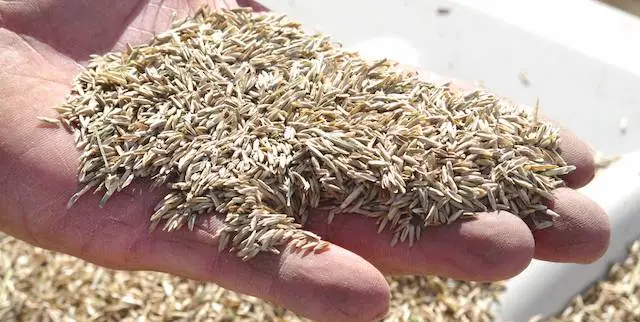
Judge denies request to merge DLF seed payment cases
Published 8:28 am Monday, October 27, 2025
An administrative judge has denied the Oregon Department of Agriculture’s request to merge six “contested cases” in which DLF USA is accused of underpaying farmers for tall fescue seed, raising concerns about delays to the proceedings.
The Oregon Grass Seed Bargaining Association, which represents growers, expects the decision will allow DLF to further postpone paying farmers the 12 cents per pound they’re owed.
“They are only slowing the process,” said Mark Simmons, OGSBA’s executive director.
Though the ruling involves six different farms, the “facts are all the same for every case:” DLF was obligated to pay 92 cents per pound of tall fescue seed — a negotiated price all the other dealers honored — but the company only paid 80 cents per pound, Simmons said.
“DLF needs to redeem their reputation and show us that their handshake actually means something,” he said. “We want to work with them but trust is essential and right now it is questionable.”
At this point, farmers have already been waiting half a year since payments were due on May 1 under Oregon’s “slow pay/no pay” law, which enforces payment terms, said Rep. Anna Scharf, R-Amity, who is pressing for speedier enforcement of the statute and accountability for DLF.
Not only will trying the cases separately tie up administrative capacity and “take time for them to push through,” but it will be an added burden for the Oregon Department of Agriculture and Department of Justice, Scharf said.
“At a time when our state agencies are looking at budget cuts and reducing costs, an international seed company is costing our state agencies money in doing investigations and taking individual cases to trial because they’re refusing to pay farmers what they legally owe them,” she said.
It’s already been determined by ODA that farmers are owed additional payments from DLF, yet the company is “dragging this on in the way that they’re dragging it on” to avoid losing its seed dealer’s license, Scharf said.
“They are costing not only growers money that they owe them, they’re costing taxpayers money,” she said. “So, all Oregon taxpayers are paying for this international seed company.”
DLF did not respond to requests for comment on the denial of the consolidation motion or the administrative process.
The ODA asked an administrative judge to consolidate the six contested cases because each will “involve similar witnesses and documents” and “serve interests of efficiency for both the agency and the party.”
“These cases involve the same common operative facts; each case relates to Respondent’s delinquency in payment due to seed producers for contracted seeds,” according to ODA.
DLF countered that these “assertions are incorrect,” since the “department fails to recognize that each individual seed producer may have distinct interactions with DLF, different circumstances, and unique relationships that distinguish one case from each of the others.”
The company also disputed that merging the enforcement actions would improve “efficiency or judicial economy,” as the resolution of each claim will still need to be “tailored to each producer” and require separate hearings.
“Further, consolidation would be inappropriate in that it would subject DLF to the risk of prejudice, in that potential liability as to one producer may be imputed to one or more other producers,” according to DLF.
Senior Administrative Law Judge Alison Webster has agreed with DLF’s arguments, finding that each case involves a separate farmer, seed contract and amount of money in dispute.
“While there is overlap in the generalities, each notice contains distinct allegations based on the specific seed producer and seed production contract at issue,” the judge said.
Depending on the amount of seed produced, each farm claims to be owed payments ranging from roughly $10,000 to $100,000.
However, the ruling said the Office of Administrative Hearings, which will oversee the cases, is willing to hold a joint pre-hearing conference for the cases about “scheduling and logistics,” which is set for Oct. 29.
Since the ODA sent the company the original six “notice of payment demands,” the agency has issued DLF an additional five letters alleging similar facts, bringing the total number of cases to 11.
Of the five new cases, DLF has already challenged three of them and ODA expects the company to object to the remaining two before its right to appeal expires in early December.
The ODA’s enforcement process against DLF has given rise to a disagreement over how the “slow pay/no pay” law is enforced.
The agency maintains the enforcement proceedings are subject to other Oregon statutes under which DLF’s seed dealer’s license cannot be suspended until the contested case process is finished.
However, that interpretation is disputed by Scharf and OGSBA, who say the clear legislative intent behind the “slow pay/no pay” was for seed dealer’s licenses to be suspended as soon as they don’t comply with ODA’s payment demand letters.
Otherwise, critics say the law won’t serve as much of a deterrent against missed, incomplete or delayed seed payments, since dealers can draw out the enforcement process while growers continue to go uncompensated.
Critics have also said that DLF’s alleged underpayments to farmers have given the company an unfair competitive advantage over other seed dealers, who paid the full 92 cents per pound for the crop.
Without directly commenting on the alleged underpayments, DLF has previously said the global market for tall fescue seed is severely oversupplied, with wholesale prices falling below what Oregon farmers were paid for the crop.
In its previous statements, the company also said the vast majority of Oregon farmers have not filed complaints with ODA and are cooperating to reduce tall fescue seed supplies to alleviate the current surplus.




